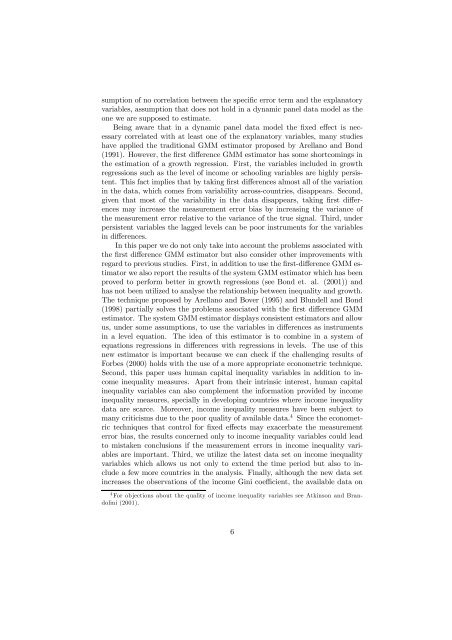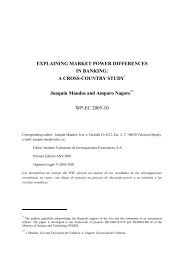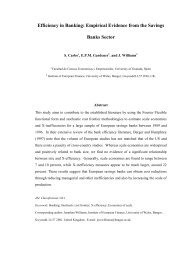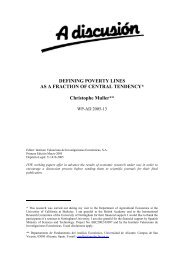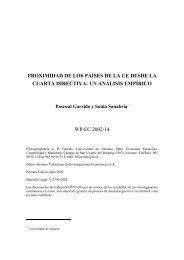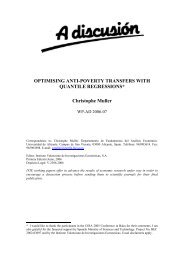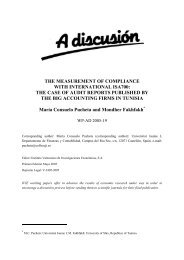Amparo Castelló-Climent, Universidad Carlos III de Madrid ... - Ivie
Create successful ePaper yourself
Turn your PDF publications into a flip-book with our unique Google optimized e-Paper software.
sumption of no correlation between the specific error term and the explanatory<br />
variables, assumption that does not hold in a dynamic panel data mo<strong>de</strong>l as the<br />
onewearesupposedtoestimate.<br />
Being aware that in a dynamic panel data mo<strong>de</strong>l the fixed effect is necessary<br />
correlated with at least one of the explanatory variables, many studies<br />
have applied the traditional GMM estimator proposed by Arellano and Bond<br />
(1991). However, the first difference GMM estimator has some shortcomings in<br />
the estimation of a growth regression. First, the variables inclu<strong>de</strong>d in growth<br />
regressions such as the level of income or schooling variables are highly persistent.<br />
This fact implies that by taking first differences almost all of the variation<br />
in the data, which comes from variability across-countries, disappears. Second,<br />
given that most of the variability in the data disappears, taking first differences<br />
may increase the measurement error bias by increasing the variance of<br />
the measurement error relative to the variance of the true signal. Third, un<strong>de</strong>r<br />
persistent variables the lagged levels can be poor instruments for the variables<br />
in differences.<br />
In this paper we do not only take into account the problems associated with<br />
the first difference GMM estimator but also consi<strong>de</strong>r other improvements with<br />
regard to previous studies. First, in addition to use the first-difference GMM estimator<br />
we also report the results of the system GMM estimator which has been<br />
proved to perform better in growth regressions (see Bond et. al. (2001)) and<br />
has not been utilized to analyse the relationship between inequality and growth.<br />
The technique proposed by Arellano and Bover (1995) and Blun<strong>de</strong>ll and Bond<br />
(1998) partially solves the problems associated with the first difference GMM<br />
estimator. The system GMM estimator displays consistent estimators and allow<br />
us, un<strong>de</strong>r some assumptions, to use the variables in differences as instruments<br />
in a level equation. The i<strong>de</strong>a of this estimator is to combine in a system of<br />
equations regressions in differences with regressions in levels. The use of this<br />
new estimator is important because we can check if the challenging results of<br />
Forbes (2000) holds with the use of a more appropriate econometric technique.<br />
Second, this paper uses human capital inequality variables in addition to income<br />
inequality measures. Apart from their intrinsic interest, human capital<br />
inequality variables can also complement the information provi<strong>de</strong>d by income<br />
inequality measures, specially in <strong>de</strong>veloping countries where income inequality<br />
data are scarce. Moreover, income inequality measures have been subject to<br />
many criticisms due to the poor quality of available data. 4 Since the econometric<br />
techniques that control for fixed effects may exacerbate the measurement<br />
error bias, the results concerned only to income inequality variables could lead<br />
to mistaken conclusions if the measurement errors in income inequality variables<br />
are important. Third, we utilize the latest data set on income inequality<br />
variables which allows us not only to extend the time period but also to inclu<strong>de</strong><br />
a few more countries in the analysis. Finally, although the new data set<br />
increases the observations of the income Gini coefficient,theavailabledataon<br />
4 For objections about the quality of income inequality variables see Atkinson and Brandolini<br />
(2001).<br />
6


